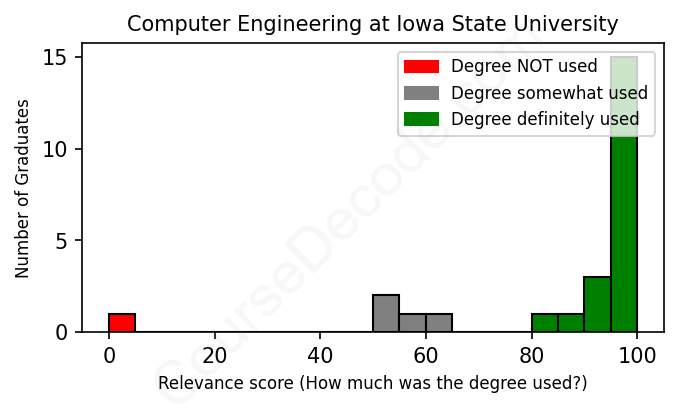
First, some facts. Of the Computer Engineering graduates from Iowa State University we've analyzed , here's how many have used (or NOT used) their degree in their career:

These are estimates based on AI analysis of 25 LinkedIn profiles (see below).
The verdict? Significantly above average. Overall, with an average relevance score of 86%, Computer Engineering graduates from Iowa State University have a much higher likelihood (+19%) of finding work in this field compared to the average graduate across all fields:
And for comparison, here's the chart for all profiles we've looked at across all degrees.
Also, after graduating, only 8% of these graduates have pursued further education other than another Bachelor's degree (such as a Masters degree or other), compared to the average across all profiles of 35%. This suggests a Bachelors degree is enough for most Computer Engineering graduates, and it's normal to look for work straight after graduation.
See the details:
|
Relevance score: 100% We think this person has gone into a career highly relevant to their degree. We think this person has gone into a career highly relevant to their degree.
DEGREE INFOGraduated in 2010 from Iowa State University with a Bachelor of Science - BS in Computer Engineering. No other secondary education since. JOB HISTORY SINCE GRADUATIONSenior Software Developer Pearson Jun 2010 - May 2018 Software Engineer  Principal Financial Group May 2018 - Present ABOUTNo information provided. |
The top 10 most common jobs done by the graduates we've analyzed (ranked most common to least) are:
When looking at the jobs held by graduates from Iowa State University's Computer Engineering program, it’s clear that a good mix of roles are out there, but many of them do have a strong connection to computer engineering. The most common positions include Software Engineer roles at various companies like Boeing, Google, and Southwest Airlines, which show that a significant number of graduates are making good use of their programming and systems knowledge. There are also roles like Firmware Engineers and Embedded Software Engineers that tie directly into the skills learned in their coursework, utilizing their understanding of hardware-software integration and firmware development. Management and consultant positions are also seen, where graduates use their technical expertise more broadly in strategic planning and advising, which, while not always hands-on engineering, still leans on their tech backgrounds.
However, not every job listed is perfectly aligned with their degree. Some roles, like IT support or certain internships, seem to draw upon some technical skills but lack that deep, core connection to computer engineering principles. Positions like a Technology Analyst, for instance, only utilize minor elements of what students learn in their degree. So, while the majority of these job roles do reflect a relevance to the field of Computer Engineering, there are also a few that stray away from the traditional engineering aspects, highlighting a diverse range of pathways that graduates can take after college.
Here is a visual representation of the most common words in job titles for Computer Engineering graduates (this is across all Computer Engineering graduates we've analyzed, not just those who went to Iowa State University):

Looking at the career paths of Iowa State University Computer Engineering graduates, it's pretty clear that many of them find themselves in solid roles in the tech industry right after graduation. Most of the profiles show that graduates often start with roles like software engineers, firmware engineers, or various technical positions. For example, people who graduated in the last few years have landed positions at big companies like Google, Boeing, and Lockheed Martin shortly after finishing their degrees, which is pretty impressive. Some have even moved quickly into senior roles or specialized positions, indicating that the job market is welcoming for these graduates.
Fast forward a few years later—like five to ten years down the line—and you'll see a lot of founders or managers; many have advanced within the tech ladder to roles such as senior software engineers, technical consultants, and even managerial positions. It seems like those who took internships during their college years have built strong connections that helped them land great jobs post-graduation. Overall, it looks like Iowa State University's Computer Engineering program equips students with the skills and opportunities to thrive in tech, leading to pretty successful careers in fields that are very relevant to their degrees.
Honestly, a Bachelor’s degree in Computer Engineering can be pretty challenging, and Iowa State University is no exception. You’ll be diving into a mix of tough math, advanced programming, and complex circuitry, which can really test your problem-solving skills. The workload can be heavy at times, with projects and labs that demand a lot of your time and energy. That said, if you’re passionate about technology and enjoy tackling puzzles, you’ll find it rewarding, even if it’s a bit on the tougher side. Just remember, it’s definitely normal to feel overwhelmed every now and then, and seeking help from professors or study groups can make a big difference!
Most commonly, in the LinkedIn profiles we've looked at, it takes people 4 years to finish a Bachelor degree in Computer Engineering.
Looking at the job histories of these Iowa State University Computer Engineering grads, it seems like they're doing pretty well in terms of making money. Many of them started off in solid entry-level positions and quickly climbed the ladder to roles like Principal Consultant, Senior Software Engineer, and even getting gigs at big names like Google and NVIDIA, which usually come with nice paychecks. While some of the more recent grads are still working their way up, the trend shows they’re landing in companies known for competitive salaries, especially in tech. Overall, it looks like a decent return on their investment in education!
Here is a visual representation of the most common words seen in the "about" section of LinkedIn profiles who have a Bachelor degree in Computer Engineering (this is across all Computer Engineering graduates we've analyzed, not just those who went to Iowa State University). This may or may not be useful:

Here are all colleges offering a Bachelor degree in Computer Engineering (ordered by the average relevance score of their Computer Engineering graduates, best to worst) where we have analyzed at least 10 of their graduates:
| College | Score | Count |
|---|---|---|
 University of Florida University of Florida
|
95 | 18 |
 Michigan State University Michigan State University
|
94 | 10 |
 Brigham Young University Brigham Young University
|
94 | 10 |
 Penn State University Penn State University
|
92 | 14 |
 California Polytechnic State University-San Luis Obispo California Polytechnic State University-San Luis Obispo
|
91 | 14 |
 University of Central Florida University of Central Florida
|
90 | 14 |
 Georgia Institute of Technology Georgia Institute of Technology
|
90 | 14 |
 Purdue University Purdue University
|
86 | 34 |
 University of Illinois at Urbana-Champaign University of Illinois at Urbana-Champaign
|
86 | 30 |
 Iowa State University Iowa State University
|
86 | 25 |
 Texas A&M University Texas A&M University
|
85 | 17 |
 San Jose State University San Jose State University
|
85 | 16 |
 Clemson University Clemson University
|
85 | 14 |
 Dwarkadas J. Sanghvi College of Engineering Dwarkadas J. Sanghvi College of Engineering
|
85 | 10 |
 North Dakota State University North Dakota State University
|
84 | 12 |
 Savitribai Phule Pune University Savitribai Phule Pune University
|
83 | 25 |
 University of Mumbai University of Mumbai
|
82 | 43 |
 New Jersey Institute of Technology New Jersey Institute of Technology
|
81 | 11 |
 University of North Carolina at Charlotte University of North Carolina at Charlotte
|
79 | 11 |
 California State Polytechnic University-Pomona California State Polytechnic University-Pomona
|
76 | 11 |
 The University of Texas at Dallas The University of Texas at Dallas
|
76 | 18 |
 University of South Florida University of South Florida
|
69 | 10 |
 Gujarat Technological University, Ahmedbabd Gujarat Technological University, Ahmedbabd
|
55 | 13 |